Story of Seven Star Mantis
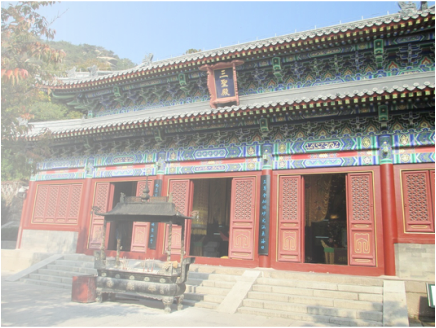
In a substantial portion of the oral and written tradition of Mantis Boxing, Wang Lang (王朗) is accredited as the founding father and the Daoist monks of Laoshan, Shandong as his initial inheritors.
Traditionally the monk responsible for transmitting the system to the first lay disciple is known as Sheng Xiao Daoren (升霄道人). Sheng Xiao Daoren may possibly have existed and indeed passed on Mantis Boxing, however this is yet to be historically verified. In Tanglang folklore he represents the generation spanning the apparent gap between the legendary founder Wang Lang, and historically verifiable figures such as Li Zhijian (李之箭) and Li Bingxiao (李炳霄), likely first generation propagators.
Although various manuscripts attributed to Sheng Xiao Daoren exist, the mysterious monk has been placed in multiple timeframes, spanning hundreds of years of Tanglang folklore. The absence of official records listing him as an actual person lends weight to the theory that Sheng Xiao Daoren was a pseudonymous identity.
Li Zhijian, AKA Li Zhizhan, Li Sanjian, and Kuaishou Li (Fast Hand Li) was born in the early 1800’s (various dates ranging from 1810-1821) in Li family village, Pingdu, Shandong. Li was a caravan escort and bodyguard who achieved wide fame working throughout Shandong, Hebei and as far afield as Fujian Province. After a storied career Li took three major disciples, nephew Li Taibao (李太宝), progenitor of Yuanyang Tanglang Hao Shunchang (郝顺昌) and most notable of all, Wang Yunsheng (王云生) AKA Wang Yongchun (born Fushan 1854, died 1926). Li eventually arrived in Fushan and made Wang Yunsheng's acquaintance. Local champion Wang had studied Ditang Quan (Ground Boxing) in his youth followed by Huashan Long Fist under Li Yichun (李义春) and opened his own boxing school at the age of twenty-three. Legend has Li defeating the 26-year-old Wang with ease in a challenge bout, with Wang subsequently begging to become his disciple. After acceptance, Li trained Wang full-time, passing on the sum total of his knowledge over three years.
Traditionally the monk responsible for transmitting the system to the first lay disciple is known as Sheng Xiao Daoren (升霄道人). Sheng Xiao Daoren may possibly have existed and indeed passed on Mantis Boxing, however this is yet to be historically verified. In Tanglang folklore he represents the generation spanning the apparent gap between the legendary founder Wang Lang, and historically verifiable figures such as Li Zhijian (李之箭) and Li Bingxiao (李炳霄), likely first generation propagators.
Although various manuscripts attributed to Sheng Xiao Daoren exist, the mysterious monk has been placed in multiple timeframes, spanning hundreds of years of Tanglang folklore. The absence of official records listing him as an actual person lends weight to the theory that Sheng Xiao Daoren was a pseudonymous identity.
Li Zhijian, AKA Li Zhizhan, Li Sanjian, and Kuaishou Li (Fast Hand Li) was born in the early 1800’s (various dates ranging from 1810-1821) in Li family village, Pingdu, Shandong. Li was a caravan escort and bodyguard who achieved wide fame working throughout Shandong, Hebei and as far afield as Fujian Province. After a storied career Li took three major disciples, nephew Li Taibao (李太宝), progenitor of Yuanyang Tanglang Hao Shunchang (郝顺昌) and most notable of all, Wang Yunsheng (王云生) AKA Wang Yongchun (born Fushan 1854, died 1926). Li eventually arrived in Fushan and made Wang Yunsheng's acquaintance. Local champion Wang had studied Ditang Quan (Ground Boxing) in his youth followed by Huashan Long Fist under Li Yichun (李义春) and opened his own boxing school at the age of twenty-three. Legend has Li defeating the 26-year-old Wang with ease in a challenge bout, with Wang subsequently begging to become his disciple. After acceptance, Li trained Wang full-time, passing on the sum total of his knowledge over three years.
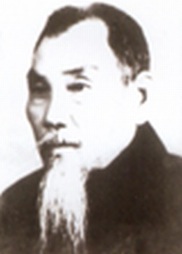 Wang Yunpeng
Wang Yunpeng
In the years following his instruction of Wang Yunsheng, Li is also said to have taught Wang Yunpeng
(王云鹏), AKA Wang Rupeng, Wang Zhuanlan and Wang Shaofei (born Anqiu 1875, died 1959-1963). Although the enigmatic Wang Yunpeng is not universally acknowledged as a direct descendant of Kuaishou Li, his descendants relate that he trained under Li in 1901 after initially studying Bagua Zhang under Ma Yulong (马玉龙). Yantai and Dalian sources claim the majority of Wang’s Qixing Tanglang was learned from Lin Jingshan (林景山), who he is said to have assisted in the instruction of the army of warlord Chu Yupu (褚玉璞) in Tianjin from 1909-1911, (alternatively, 1911-1914). Notably, little of the curriculum of his descendants closely resembles that of greater Qixing. Regardless of the veracity of the claims regarding the source of his material, he enjoyed great fame throughout China over a lengthy career, including residence as an instructor at the Nanjing Zhongyang Guoshuguan (Nanjing Central Guoshu Institute) in 1929 before arriving in Qingdao in 1930 where he went on to gain almost legendary status.
Wang Yunpeng suffered political persecution late in life allegedly due to his association with the Guomindang (Nationalist Party). Some of the apparent disregard for his legacy may have arisen from the associated negativity of this period. Regardless, Wang Yunpeng’s particular brand of Qixing Tanglang exists to this day in Qingdao and the Dongbei region (Liaoning, Jilin and Heilongjiang). Notable disciples included Wang Qingzhai (王庆齐), Wang Xiuhua (王秀华), who taught in Shenyang and Dalian respectively, Wang Qianwu (王谦武) , Wang Qianlong (王谦龙), Zhang Suochun (张所春) and Song Lishan (宋立山) in Qingdao.
(王云鹏), AKA Wang Rupeng, Wang Zhuanlan and Wang Shaofei (born Anqiu 1875, died 1959-1963). Although the enigmatic Wang Yunpeng is not universally acknowledged as a direct descendant of Kuaishou Li, his descendants relate that he trained under Li in 1901 after initially studying Bagua Zhang under Ma Yulong (马玉龙). Yantai and Dalian sources claim the majority of Wang’s Qixing Tanglang was learned from Lin Jingshan (林景山), who he is said to have assisted in the instruction of the army of warlord Chu Yupu (褚玉璞) in Tianjin from 1909-1911, (alternatively, 1911-1914). Notably, little of the curriculum of his descendants closely resembles that of greater Qixing. Regardless of the veracity of the claims regarding the source of his material, he enjoyed great fame throughout China over a lengthy career, including residence as an instructor at the Nanjing Zhongyang Guoshuguan (Nanjing Central Guoshu Institute) in 1929 before arriving in Qingdao in 1930 where he went on to gain almost legendary status.
Wang Yunpeng suffered political persecution late in life allegedly due to his association with the Guomindang (Nationalist Party). Some of the apparent disregard for his legacy may have arisen from the associated negativity of this period. Regardless, Wang Yunpeng’s particular brand of Qixing Tanglang exists to this day in Qingdao and the Dongbei region (Liaoning, Jilin and Heilongjiang). Notable disciples included Wang Qingzhai (王庆齐), Wang Xiuhua (王秀华), who taught in Shenyang and Dalian respectively, Wang Qianwu (王谦武) , Wang Qianlong (王谦龙), Zhang Suochun (张所春) and Song Lishan (宋立山) in Qingdao.
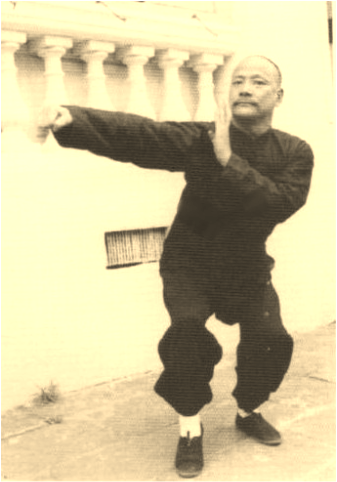 Luo Guangyu
Luo Guangyu
After successfully transmitting his Mantis Boxing corpus, Kuaishou Li continued his escort work, ending his illustrious career in Tianjin, Hebei. Li’s greatest disciple, Wang Yunsheng is widely, yet not universally, considered as the founder of Seven Star Mantis Boxing. The core syllabus of Qixing Tanglang arises from the era of Wang Yunsheng, with manuscripts and oral transmission also attributing the coining of the family name to him. The ‘Seven Stars’, though literally referring to the constellation of the Big Dipper, more generally represent an expression of harmonious integration of the seven major body components (head, shoulder, elbow, hand, hip, knee and foot) in action.
Wang Yunsheng taught three major disciples; Wang Yunfu, Wang Jie and most acclaimed, Fan Xudong (范旭东), born Haiyang - unverified birth-date between 1840 and 1875, unverified death-date circa 1936. Yantai resident Fan Xudong, AKA Fan Xiangsheng and Fan Dali (Powerful Fan), commenced training under Wang in 1894 and went on to gain fame as the first so-called Tanglang Wang (King of Mantis Boxing). Allegedly a giant, weighing in excess of 100kg, he is one of the most influential figures in the Qixing tradition. Fan gained international notoriety for his feats, including reportedly defeating all comers in a Siberian leitai/free fighting competition in 1919 and remaining unbeaten throughout a lengthy career in the ultra-competitive Yantai martial arts market. Although most likely a shining example of martial folklore, it is often related that Fan killed two hostile bulls bare-handed in an open field, paying cash compensation to the farmer for the inconvenience.
Fan Xudong opened his own boxing school in 1901 and went on to produce nine major disciples: Gou Jialu (郭嘉禄), Yang Weixin (杨维新), Lin Jingshan, Lou Guangyu (罗光玉) , Xiao Shubin (肖树斌), Zhang Youde (张有德), Liu Yongchang (刘永昌), Zhao Liangfu (赵亮甫) and Grandson of Wang Yunsheng, Wang Chuanyi (王传义). Senior disciple Yang Weixin (born Penglai 1880, died 1966) ran classes on behalf of Fan from the early 1900’s. Yang was a fierce man with a short temper and a bad reputation for heavy handedness. He allegedly crippled a number of opponents (even severely injuring some of his own students) and was prosecuted in 1910 for the killing of two rival mantis boxers with the use of a cudgel. Yang was released after only one year due to Fan Xudong's financial intervention and connections.
Not long after his successful trip to Siberia, Fan was invited to coach in the Shanghai Jingwu Athletic Association. A busy merchant with many business interests in Yantai, Fan declined the offer, opting to send representatives in his place. The following year Lou Guangyu, and Yang Weixin travelled to Shanghai to represent Qixing Tanglang (at both Jingwu and the Shanghai Tanglang Research Association), joined in 1923 by Wang Chuanyi. Having already officially taken over Fan’s academy from Yang Weixin upon his return from Tianjin (a reported sojourn not universally agreed upon by his descendants), Lin Jingshan remained in Yantai as the senior representative of the family.
Wang Yunsheng taught three major disciples; Wang Yunfu, Wang Jie and most acclaimed, Fan Xudong (范旭东), born Haiyang - unverified birth-date between 1840 and 1875, unverified death-date circa 1936. Yantai resident Fan Xudong, AKA Fan Xiangsheng and Fan Dali (Powerful Fan), commenced training under Wang in 1894 and went on to gain fame as the first so-called Tanglang Wang (King of Mantis Boxing). Allegedly a giant, weighing in excess of 100kg, he is one of the most influential figures in the Qixing tradition. Fan gained international notoriety for his feats, including reportedly defeating all comers in a Siberian leitai/free fighting competition in 1919 and remaining unbeaten throughout a lengthy career in the ultra-competitive Yantai martial arts market. Although most likely a shining example of martial folklore, it is often related that Fan killed two hostile bulls bare-handed in an open field, paying cash compensation to the farmer for the inconvenience.
Fan Xudong opened his own boxing school in 1901 and went on to produce nine major disciples: Gou Jialu (郭嘉禄), Yang Weixin (杨维新), Lin Jingshan, Lou Guangyu (罗光玉) , Xiao Shubin (肖树斌), Zhang Youde (张有德), Liu Yongchang (刘永昌), Zhao Liangfu (赵亮甫) and Grandson of Wang Yunsheng, Wang Chuanyi (王传义). Senior disciple Yang Weixin (born Penglai 1880, died 1966) ran classes on behalf of Fan from the early 1900’s. Yang was a fierce man with a short temper and a bad reputation for heavy handedness. He allegedly crippled a number of opponents (even severely injuring some of his own students) and was prosecuted in 1910 for the killing of two rival mantis boxers with the use of a cudgel. Yang was released after only one year due to Fan Xudong's financial intervention and connections.
Not long after his successful trip to Siberia, Fan was invited to coach in the Shanghai Jingwu Athletic Association. A busy merchant with many business interests in Yantai, Fan declined the offer, opting to send representatives in his place. The following year Lou Guangyu, and Yang Weixin travelled to Shanghai to represent Qixing Tanglang (at both Jingwu and the Shanghai Tanglang Research Association), joined in 1923 by Wang Chuanyi. Having already officially taken over Fan’s academy from Yang Weixin upon his return from Tianjin (a reported sojourn not universally agreed upon by his descendants), Lin Jingshan remained in Yantai as the senior representative of the family.
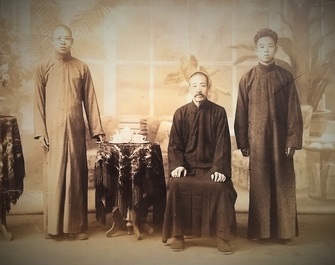 Xiao Shubin, Fan Xudong and Hu Yongfu
Xiao Shubin, Fan Xudong and Hu Yongfu
Luo Guangyu (born Penglai1888, died 1944) went on to become perhaps Tanglang's most famous figure. He began his martial career at the age of 18 and studied with Fan Xudong until the age of 25, excelling in free fighting (including winning a gold shield in the 1919 Siberian leitai competition) and developing devastating iron palm skill. Under Fan's patronage Luo Guangyu flourished in Shanghai and rapidly gained fame for his fighting ability, becoming officially titled one of the ‘Three great boxers of Shanghai Jingwu’.
Folklore has Yang Weixin faring poorly in his efforts as an ambassador for Shandong Tanglang. Apparently unhappy with the Shanghai climate, food and people, who seemed equally opposed to his short temper and rough manner, Yang Weixin returned to Shandong before 1930, eventually settling in Qingdao until his death at the age of 86. Yang Weixin passed on his Mantis Boxing to Lu Qingping (陆清平), Mu Zhuanzu (牟转组), Liu Yunchang (刘运昌), Dong Shixun (董世训), Chen Ruoping (陈若萍) and Xiao Shubin. Yang goes down in history as one of Fan Xudong's toughest descendants, with combat as his forte.
Xiao Shubin (born Yantai 1885, died 1946) commenced training under Fan Xudong in 1898. He moved to Dalian, Liaoning and commenced teaching Qixing Tanglang in 1905, eventually founding the Yingbin Wuguan (Ying Bin Martial Academy) at Xigang Shijie Guan (Xigang District World Academy), AKA Shijie and Sijie Wuguan in 1909. The academy, which produced many of the Qixing greats, was handed over to Hu Yongfu in 1945, the year before Xiao Shubin’s death, before finally being passed on to Wang Chuanyi in 1952 upon Hu’s return to Shandong. Xiao Shubin went on to further refine his Tanglang under Yang Weixin, transmitting the art to Fu Yougui (傅有贵), Huang Kezhen (黄克珍), Liu Lixing (刘力行), Zhang Qinghe (张庆和) and Li Huitang (李会堂), AKA Li Zhanyuan (李占元) amongst many others.
Luo Guangyu's success grew with his student Ma Chengxin (马成鑫) winning the title of leitai grand champion at the national martial arts championships in 1929. After teaching in Guangzhou later in the same year and a brief stint in Macao, Luo moved to Hong Kong in 1932 to help establish the Jingwu Hui and remained until his retirement in 1939. Some of Luo's most famous students were Guo Zuchao (郭祖超), Guo Zishi (郭子硕), Chen Zhenyi (陈震仪), Huang Hanxun (黄汉勋), Zhao Zhimin (赵志民) and Huang Jinhong (黃锦洪) – who along with Lin Boyan (林伯炎), went on to disseminate Qixing Tanglang in South East Asia. Descendants of Huang Hanxun and Zhao Zhimin in particular are responsible for the spread of Luo’s Tanglang throughout the rest of the world.
Although apparently initially implementing his Jingwu programme under the generic classification of Tanglang Men (equivalent to Mantis Family or ‘Greater’ Mantis), Luo Guangyu can be considered the father of Jingwu Qixing Tanglang or what became later known as Bei Qixing Tanglang (Northern Seven Star Mantis). His boxing catalogue was greatly enriched, with many empty hand and weapons sets developed, including the addition of fundamental Jingwu forms, such as Gong Li Quan (Power Boxing). After an impressive career and a contribution to Tanglang virtually unmatched, Luo returned to Shanghai not long after the Japanese invasion of Hong Kong before suddenly dying two years later at the age of 56. Although it is said that Luo passed away in Shanghai, alternative sources state that he died on his way home to Penglai. Luo’s blood descendants continue to live in Penglai today but have not continued his martial legacy.
Folklore has Yang Weixin faring poorly in his efforts as an ambassador for Shandong Tanglang. Apparently unhappy with the Shanghai climate, food and people, who seemed equally opposed to his short temper and rough manner, Yang Weixin returned to Shandong before 1930, eventually settling in Qingdao until his death at the age of 86. Yang Weixin passed on his Mantis Boxing to Lu Qingping (陆清平), Mu Zhuanzu (牟转组), Liu Yunchang (刘运昌), Dong Shixun (董世训), Chen Ruoping (陈若萍) and Xiao Shubin. Yang goes down in history as one of Fan Xudong's toughest descendants, with combat as his forte.
Xiao Shubin (born Yantai 1885, died 1946) commenced training under Fan Xudong in 1898. He moved to Dalian, Liaoning and commenced teaching Qixing Tanglang in 1905, eventually founding the Yingbin Wuguan (Ying Bin Martial Academy) at Xigang Shijie Guan (Xigang District World Academy), AKA Shijie and Sijie Wuguan in 1909. The academy, which produced many of the Qixing greats, was handed over to Hu Yongfu in 1945, the year before Xiao Shubin’s death, before finally being passed on to Wang Chuanyi in 1952 upon Hu’s return to Shandong. Xiao Shubin went on to further refine his Tanglang under Yang Weixin, transmitting the art to Fu Yougui (傅有贵), Huang Kezhen (黄克珍), Liu Lixing (刘力行), Zhang Qinghe (张庆和) and Li Huitang (李会堂), AKA Li Zhanyuan (李占元) amongst many others.
Luo Guangyu's success grew with his student Ma Chengxin (马成鑫) winning the title of leitai grand champion at the national martial arts championships in 1929. After teaching in Guangzhou later in the same year and a brief stint in Macao, Luo moved to Hong Kong in 1932 to help establish the Jingwu Hui and remained until his retirement in 1939. Some of Luo's most famous students were Guo Zuchao (郭祖超), Guo Zishi (郭子硕), Chen Zhenyi (陈震仪), Huang Hanxun (黄汉勋), Zhao Zhimin (赵志民) and Huang Jinhong (黃锦洪) – who along with Lin Boyan (林伯炎), went on to disseminate Qixing Tanglang in South East Asia. Descendants of Huang Hanxun and Zhao Zhimin in particular are responsible for the spread of Luo’s Tanglang throughout the rest of the world.
Although apparently initially implementing his Jingwu programme under the generic classification of Tanglang Men (equivalent to Mantis Family or ‘Greater’ Mantis), Luo Guangyu can be considered the father of Jingwu Qixing Tanglang or what became later known as Bei Qixing Tanglang (Northern Seven Star Mantis). His boxing catalogue was greatly enriched, with many empty hand and weapons sets developed, including the addition of fundamental Jingwu forms, such as Gong Li Quan (Power Boxing). After an impressive career and a contribution to Tanglang virtually unmatched, Luo returned to Shanghai not long after the Japanese invasion of Hong Kong before suddenly dying two years later at the age of 56. Although it is said that Luo passed away in Shanghai, alternative sources state that he died on his way home to Penglai. Luo’s blood descendants continue to live in Penglai today but have not continued his martial legacy.
 Lin Jingshan
Lin Jingshan
Fan Xudong's most important student from a Shandong perspective was the great Lin Jingshan. Lin (born in 1885 Laiyang, died 1971) moved to nearby Yantai City as a small child where he lived until the Cultural Revolution, shortly before his death at the age of 86. Lin Jingshan barely scraped a living in the markets and streets of Yantai labouring as a cook's helper and street hawker. Working as a shop assistant Lin Jingshan yearned to study boxing and secretly watched and imitated Fan Xudong and his students training until Fan discovered him practicing and apprehended him. Surprised by his natural ability and keenness to learn, Fan Xudong took Lin under his wing in 1902, eventually officially passing the Yantai school into his capable hands upon retirement.
Apart from the aforementioned period in Tianjin, Lin spent the rest of his life teaching in Yantai, both in the public school system and in his own martial associations (including the Jingshan Wushu Society) where he produced many famous disciples until returning to his home village of Jiangtuan in 1969 before passing away two years later. Lin Jingshan was survived by three sons, Lin Chunsheng (林春生), Lin Chunfa (林春发) and Lin Shangwei (林尚伟). Lin Dongzhu (林栋柱), son of Lin Shangwei studied with his Grandfather as a youth and continued training under senior family members after Lin’s death in 1971. Lin Dongzhu currently teaches Qixing Tanglang in Laiyang, Shandong.
Lin Jingshan's best known disciples include; Hu Yongfu (胡永福), Shao Huating (邵华亭), Ling Huatang (陵华堂), Wang Chunshan (王春山), Yu Zhenhai (于振海), Yu Tiancheng (于天程), Yu Tianlu (于天路), Yu Renzhu (于仁柱), Yu Tiantang (于天堂), AKA Yu Hai (于海), and Zhong Lianbao(钟连宝). Hu Yongfu (born Laiyang 1888, died 1973) is widely acknowledged as Lin's greatest disciple. Hu commenced training under Lin Jingshan in 1912 and went on to join Xiao Shubin at the Yingbin Wuguan in Dalian in 1920, taking over the academy ten years later. Amongst Hu Yongfu's many disciples were Li Ruinian (李瑞年(, Xu Hongxun (徐洪勛), Li Shishuai (李世帅), Hu’s son Hu Dongming (胡东明) and Wang Qinggang (王清刚) - who became the progenitor of Qixing Tanglang in Jinzhou.
Apart from the aforementioned period in Tianjin, Lin spent the rest of his life teaching in Yantai, both in the public school system and in his own martial associations (including the Jingshan Wushu Society) where he produced many famous disciples until returning to his home village of Jiangtuan in 1969 before passing away two years later. Lin Jingshan was survived by three sons, Lin Chunsheng (林春生), Lin Chunfa (林春发) and Lin Shangwei (林尚伟). Lin Dongzhu (林栋柱), son of Lin Shangwei studied with his Grandfather as a youth and continued training under senior family members after Lin’s death in 1971. Lin Dongzhu currently teaches Qixing Tanglang in Laiyang, Shandong.
Lin Jingshan's best known disciples include; Hu Yongfu (胡永福), Shao Huating (邵华亭), Ling Huatang (陵华堂), Wang Chunshan (王春山), Yu Zhenhai (于振海), Yu Tiancheng (于天程), Yu Tianlu (于天路), Yu Renzhu (于仁柱), Yu Tiantang (于天堂), AKA Yu Hai (于海), and Zhong Lianbao(钟连宝). Hu Yongfu (born Laiyang 1888, died 1973) is widely acknowledged as Lin's greatest disciple. Hu commenced training under Lin Jingshan in 1912 and went on to join Xiao Shubin at the Yingbin Wuguan in Dalian in 1920, taking over the academy ten years later. Amongst Hu Yongfu's many disciples were Li Ruinian (李瑞年(, Xu Hongxun (徐洪勛), Li Shishuai (李世帅), Hu’s son Hu Dongming (胡东明) and Wang Qinggang (王清刚) - who became the progenitor of Qixing Tanglang in Jinzhou.
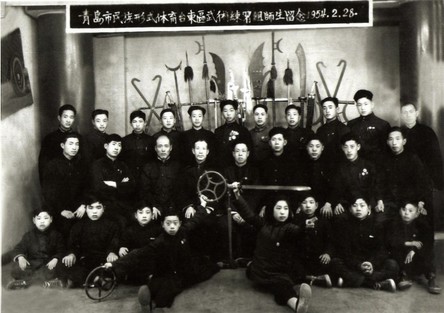 Qingdao 1954
Qingdao 1954
It was in Dalian where Hu Yongfu taught his most famous disciple - Li Zhanyuan, who initially began his training under Yang Weixin and Xiao Shubin in 1913. Leaving Dalian in 1941, Li went on to popularize Qixing Tanglang in Qingdao where he further developed and transmitted the system over the next five decades before passing away in 1992. Notable amongst his descendants were Bo Qingwen (卜庆文), Chen Guozhu (陈国柱), Zhu Minghai (朱明海), Gao Shuzeng (高述增), Wang Daiyin (王岱贤), Wang Shipu (王士普), Zhou Yande (周延德), Jie Enli 解恩礼, Liu Chongxi (刘崇喜), Liu Chongyuan (刘崇元), Zhang Wendong (张文东), Ji Xuegong (纪学公), Chu Xueling(初学玲), Chu Xueli (初学礼), Du Yueying (杜月英), Kang Zhiqiang (康志强), Gao Xingliang (高兴亮), Qiu Fangjian (邱方检), Qin Guihua (秦桂花), Chen Leping (陈乐平) and Wang Xiaohua (王小华).
Wang Xiaohua was the first to spread Li Zhanyuan’s Tanglang internationally, migrating to Australia in the late 1980s and founding the Tanglang Quan She (Mantis Boxing Society) in 1992.
Wang Xiaohua was the first to spread Li Zhanyuan’s Tanglang internationally, migrating to Australia in the late 1980s and founding the Tanglang Quan She (Mantis Boxing Society) in 1992.
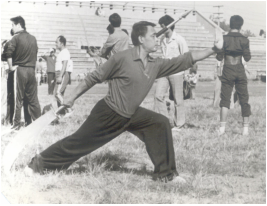 Yu Tiancheng
Yu Tiancheng
In the modern era Yu Tiancheng went on to become one of Lin Jingshan's greatest disciples. Born in 1937 in Yantai, Yu was well versed in Ditang and Chang Quan before he commenced his study with Lin at age 14. He continued to transmit Qixing Tanglang until his sudden passing in 2004, producing many notable disciples such as Liu Xianming (刘先明), Yu Lianyou (于连友), Lu Tingbo (禄挺波), Wang Baolin (王宝林), Gong Yunfei (宫云飞), Shi Guoyu (石国玉), and Slawomir Milczarek of the Polish Praying Mantis Kung Fu Society - who introduced Yu’s Tanglang to Europe in 1993. Yu Tiancheng's brother Yu Tianlu ran the Qixing Tanglang Wuguan in Yantai until his untimely death in 2013. Yu Tianlu greatly popularised the Yu brothers approach to Qixing Tanglang in his final years, teaching many local and international students.
Zhong Lianbao is another outstanding disciple of Lin Jingshan, responsible for spreading his Tanglang throughout the world, with strongholds in Germany, Italy, Spain and the Philippines. Zhong’s disciples include Wang Liguo (王立国), Zhong Xiang (钟响), Zhong Qiyong (钟其勇), Zhong Zhiping (钟志平) and Arnold Buenviaje, AKA Cai Mingren (蔡明仁) of the Qixing Tanglang Quan Association Philippines.
Wang Chuanyi (born Fushan 1900, died 1971) went on to become perhaps the most influential Qixing propagator in Dalian in the latter half of the 20th century, teaching tirelessly until returning to Yantai to see out his life. Notable amongst many others, son Wang Yanqing and disciples Ma Guangyou (马广友) and Chi Xueyuan (迟学元) went on to transmit Wang Chuanyi’s extensive syllabus.
Zhong Lianbao is another outstanding disciple of Lin Jingshan, responsible for spreading his Tanglang throughout the world, with strongholds in Germany, Italy, Spain and the Philippines. Zhong’s disciples include Wang Liguo (王立国), Zhong Xiang (钟响), Zhong Qiyong (钟其勇), Zhong Zhiping (钟志平) and Arnold Buenviaje, AKA Cai Mingren (蔡明仁) of the Qixing Tanglang Quan Association Philippines.
Wang Chuanyi (born Fushan 1900, died 1971) went on to become perhaps the most influential Qixing propagator in Dalian in the latter half of the 20th century, teaching tirelessly until returning to Yantai to see out his life. Notable amongst many others, son Wang Yanqing and disciples Ma Guangyou (马广友) and Chi Xueyuan (迟学元) went on to transmit Wang Chuanyi’s extensive syllabus.
